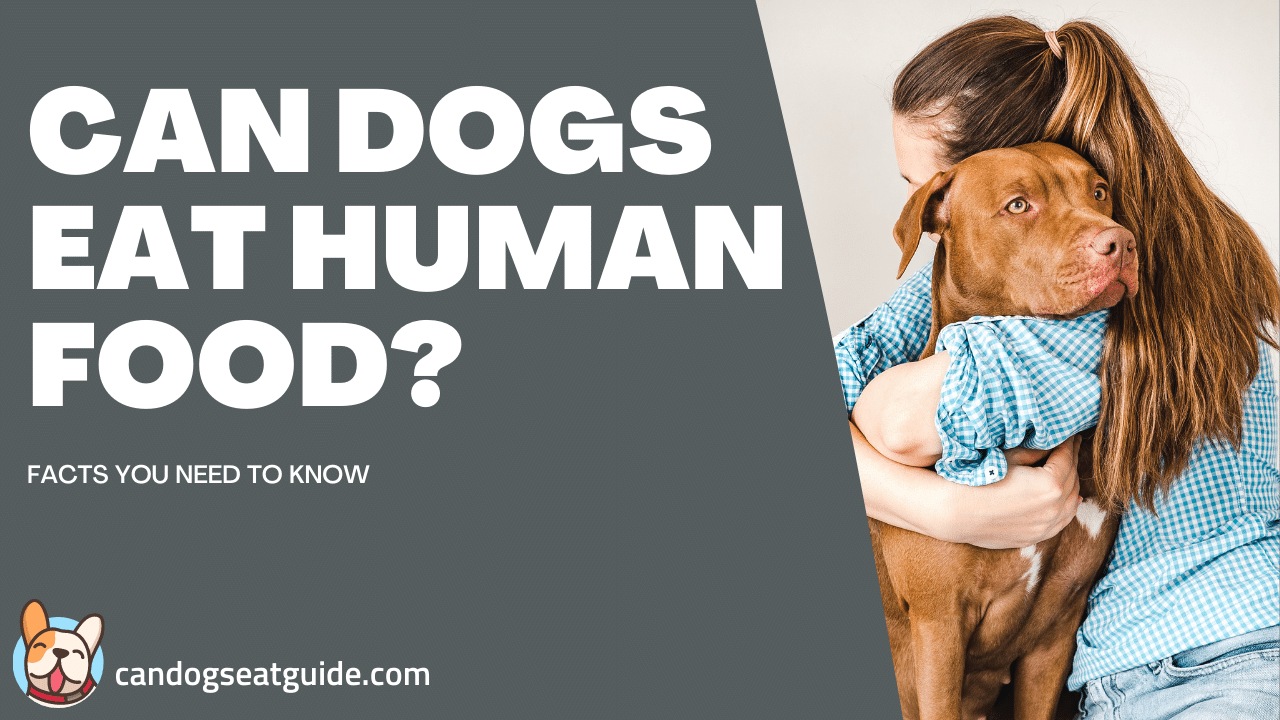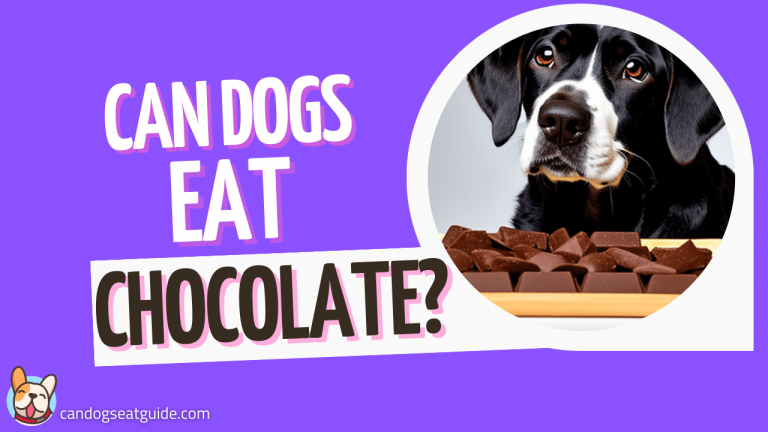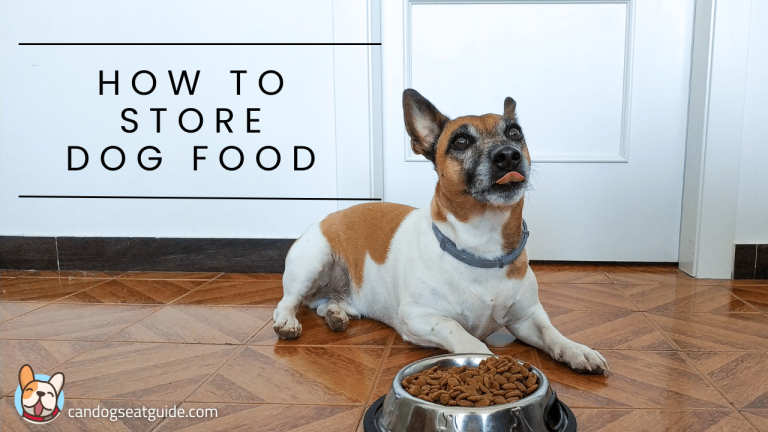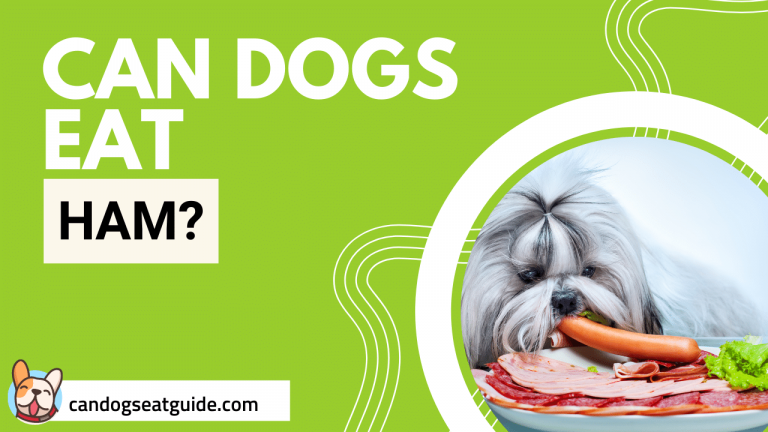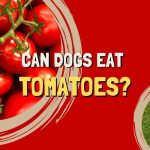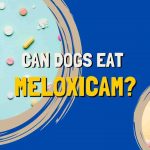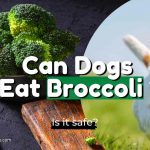This topic doesn’t have an end. Some vets are totally against giving our dogs human food and they have their reasons, of course, but the coin has two sides.
The other side of vets and specialists say that dogs can eat some veggies and fruits but we should be careful as some of them are toxic, some aren’t a good fit for dogs with health problems, or some shouldn’t be given in the puppy stage.
I will give you a long list of human foods that dogs can eat and another one of the foods that dogs should stay away from. So the next time you see these puppy eyes looking at you, you will know if you can give this food or not.
But remember your dog is the only being that will “tell” you if this human food – veggie, fruit, meat, or some dish is good for them. You should always check your four-legged friends for any signs of bad reactions as it’s possible allergies to occur.
Can Dogs Eat Human Food As Their Only Source of Nutrition?
No, dogs shouldn’t eat only human food as they need nutrition that is specifically for them – that’s why they should eat their dog food as the main source of a balanced diet, and sometimes they can have human treats.
There are many ways of including human food on a dog’s menu but you should be careful how you do it. Too much human food won’t be healthy for your dog and it should be given only occasionally.
The Ten Percent Rule
I want to show you one really important but simple rule that every dog parent should follow for the good health of their pets.
When you give treats to dogs, no matter if they are dog treats or human treats, they should not be more than 10% of the dog’s calorie intake for the day.
This 10% should be part of this calorie intake not added extra. So when you want to give them some treats it’s better to lessen their main food.
Can Dogs Eat Table Food?
Table food is the food that is our source of nutrition and in it, I don’t include raw fruits and veggies.
Can dogs eat our cooked food?
Depends on:
- the dish
- is it fried?
- is it baked?
- is it steamed?
- is it boiled?
- the way of cooking
- are there any added herbs and species?
- is there added oil?
- is there included salt?
- the ingredients
- some ingredients like honey and garlic shouldn’t be given to dogs even if cooked as they are toxic;
- for example, if your dog is lactose intolerant, then it shouldn’t eat food containing dairy products like milk, yogurt, butter, whipped cream, etc;
- the calorie content
- if this dish is too caloric then it wouldn’t be a good idea for dogs that are having problems with weight or even obesity;
As you see there are many things that you need to know before giving even a bit of cooked dish.
If you want to give your dog some cooked food, think about that while cooking it. Cook aside a little bit of the same dish just without bad and toxic components. Salt and oils aren’t beneficial for dogs’ health, they are bad as a lot of consumption can lead to gastrointestinal problems like bloating, abdomen pain, gas, diarrhea, constipation, and a lot of diseases.
If you include new food as a treat, you should start with a very little amount. Even if it is very tasty for your dog, stay on the little amount, and check for signs of irritation in the next 24 hours.
Can Dogs Eat Raw Veggies?
Yes and No.
How?
Some vegetables are very good for dogs’ health as they give some extra vitamins and minerals. But in some cases, veggies are toxic to them.
How veggies are toxic to dogs but not to us?
Even we can feel some irritation when we some vegetables, but as the digestive system of dogs is different than human one, it’s normal. Some components found in veggies are toxic to dogs. For example, garlic and onion contain thiosulfate, which is toxic to dogs.
Toxic veggies in raw form:
- garlic;
- onion;
- wild mushrooms;
- unripe tomatoes;
- raw potato.
Garlic and onion are toxic in raw and cooked forms. They should be avoided!
While wild mushrooms are poisonous, the white mushrooms in stores are safe for our four-legged friends.
Green tomatoes aren’t safe for dogs, but red ripped tomatoes can be eaten by dogs in small amounts without causing any problems.
Raw potatoes are bad for dogs, later in the article, you can see if cooked potatoes are bad or good.
Can Dogs Eat Veggies And Which of Them Can Be Cooked?
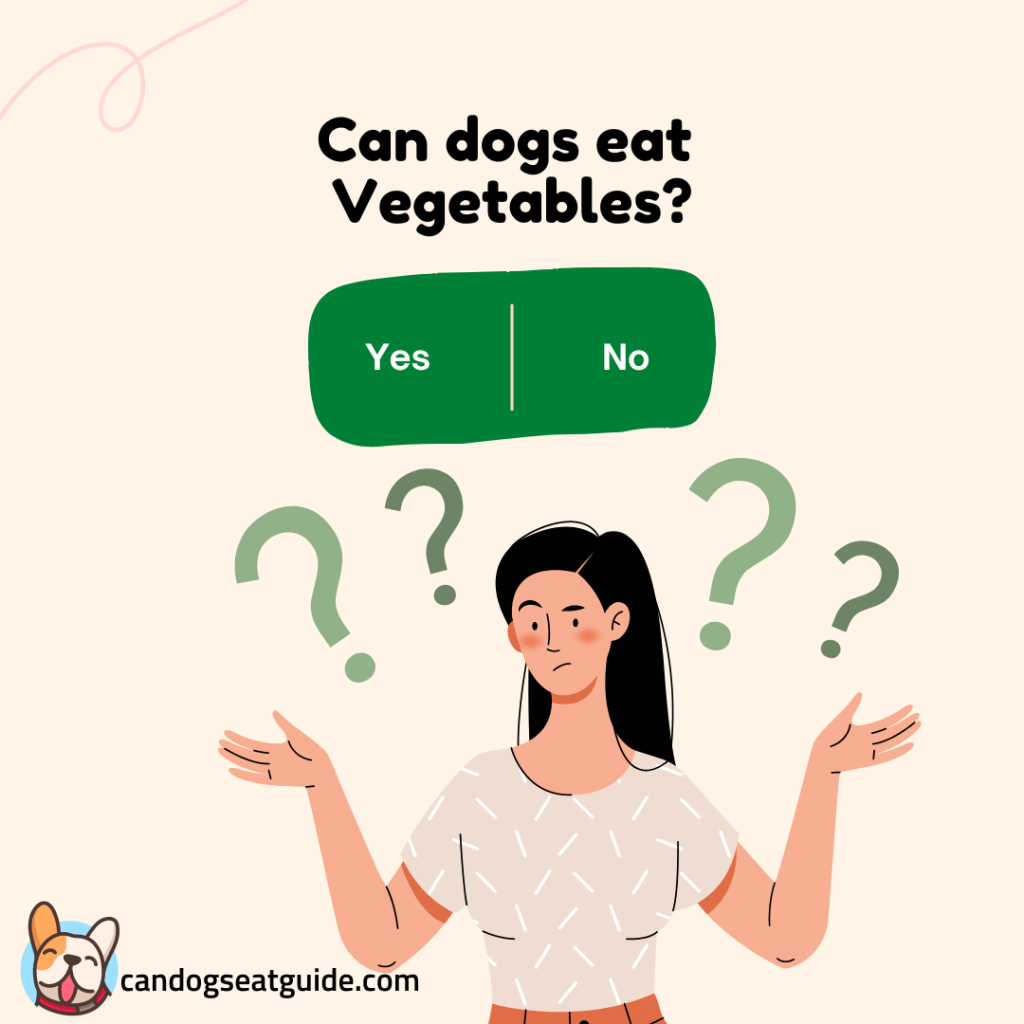
Yes, dogs can eat the veggies cooked. But I am sure you need a more detailed answer. I will give you 15 examples of veggies that can be eaten safely in moderation, so let’s start:
1. Tomatoes
As you got to know unripped tomatoes aren’t safe for dogs, it’s time to see what is the situation with ripped tomatoes and whether can they be eaten cooked.
Tomatoes, if they are ripped, can be eaten both raw and cooked, in a small amount of course. They should be cooked as the content of solanine decreases with cooking.
Can dogs eat tomato soup?
Yes, dogs can eat tomato soup but you should make sure to not add garlic, onion, oil, and any seasoning.
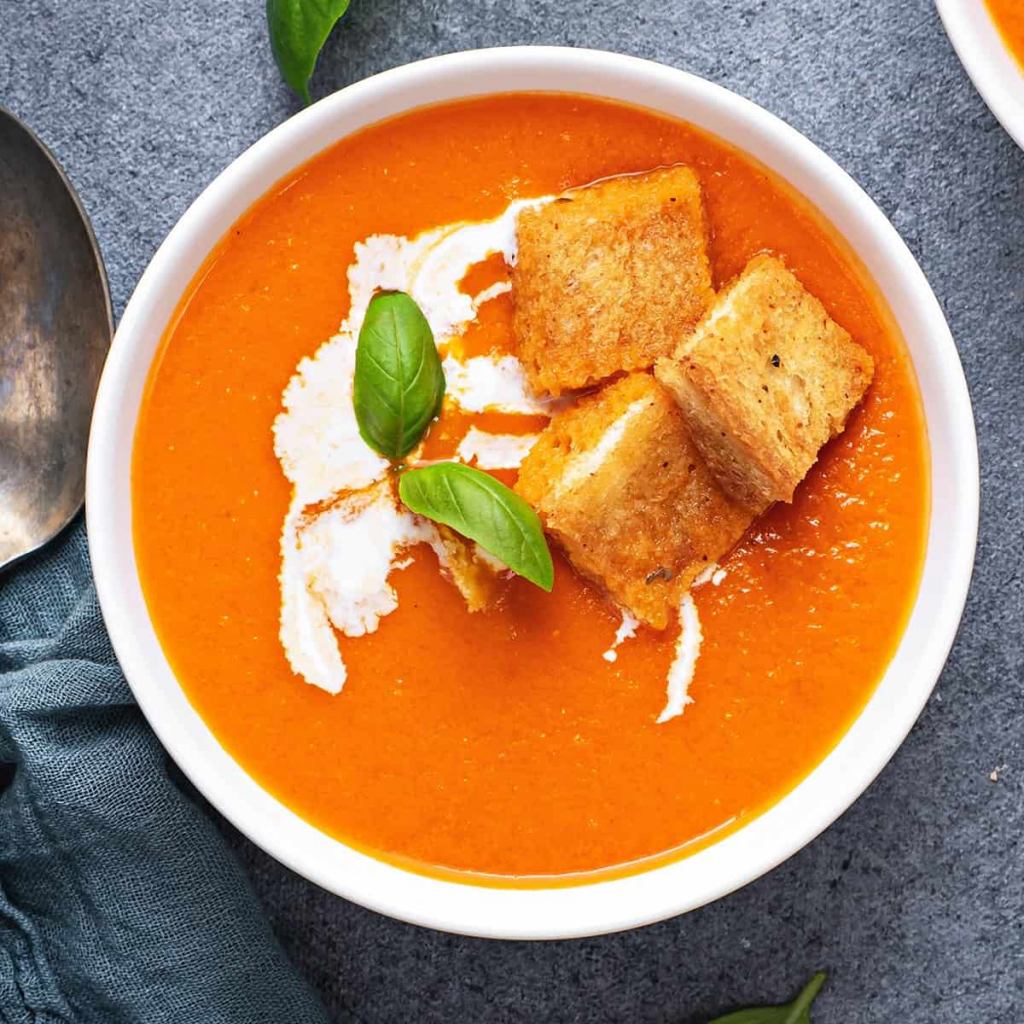
Nutrition dogs can get from tomatoes:
- Vitamin C
- Carbs
- Fiber
2. Broccoli
Dogs can eat raw and cooked broccoli, but the preferable way is to cook. In its raw form broccoli is difficult for dogs to chew, when it’s steamed it’s easier for dogs and their digestive system. You can use it as a part of some recipes but without seasoning and oil.
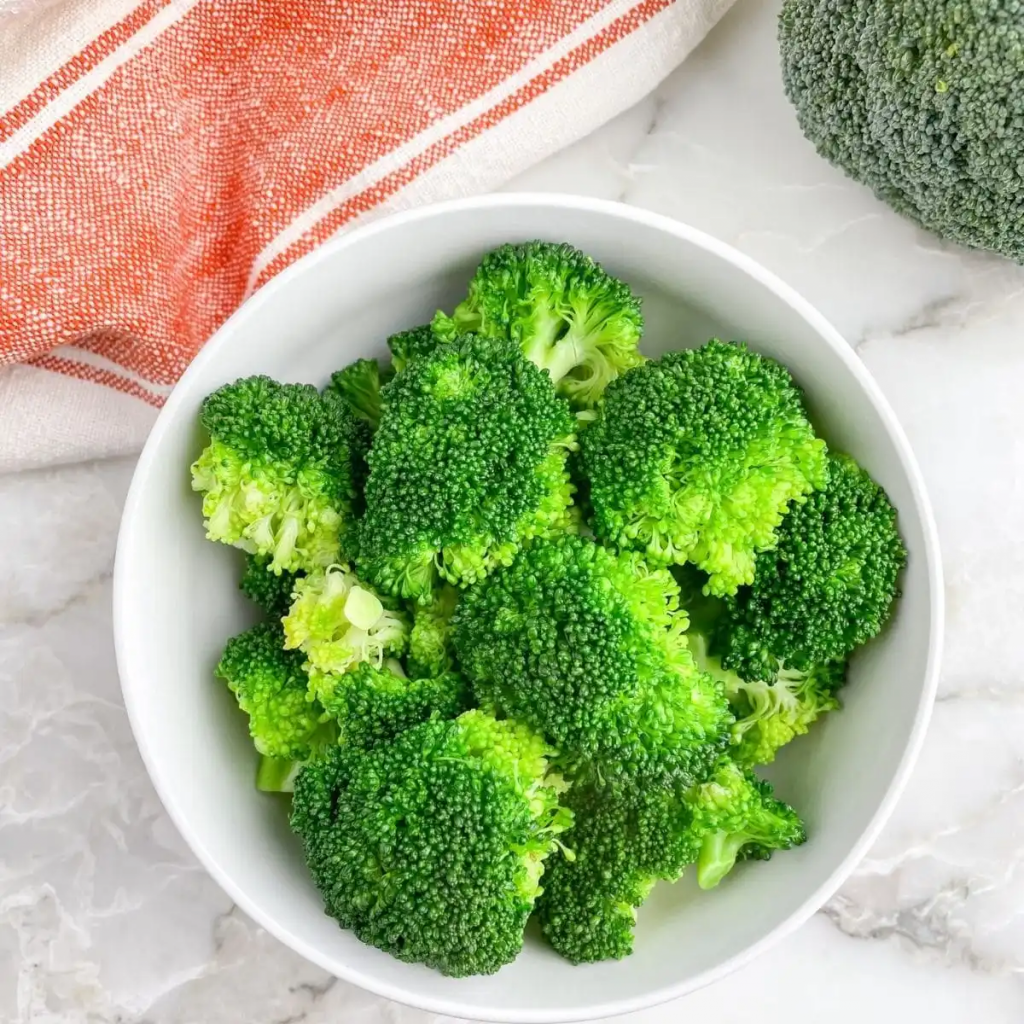
Nutrition dogs can get from broccoli:
- Potassium
- Protein
- Calcium
- Carbs
3. Cucumbers
Cucumbers are safe for dogs. They should be of course given in moderation. Cucumbers are 96% water. Make sure to peel the skin and remove the seeds of the cucumber before feeding your pooch. Don’t give more than 2-3 slices.
It will be a great low-calorie snack for your dog during hot summer days.
Nutrition dogs can get from cucumbers:
- Potassium
- Vitamin C
- Vitamin A
- Calcium
4. Corn
Corn can be given cooked, or canned, and the only thing you should make sure dogs don’t eat is the corn cob and corn husks. Corn cob can use gastrointestinal obstruction.
Nutrition dogs can get from corn:
- Potassium
- Carbohydrates
- Magnesium
- Phosphorus
5. Mushrooms
Wild mushrooms are poisonous. Raw mushrooms can cause a lot of trouble for the stomach of your doggo.
Cooked mushrooms are safe for dogs – avoid garlic and onion. Mushrooms are known worldwide as vegetable meat.
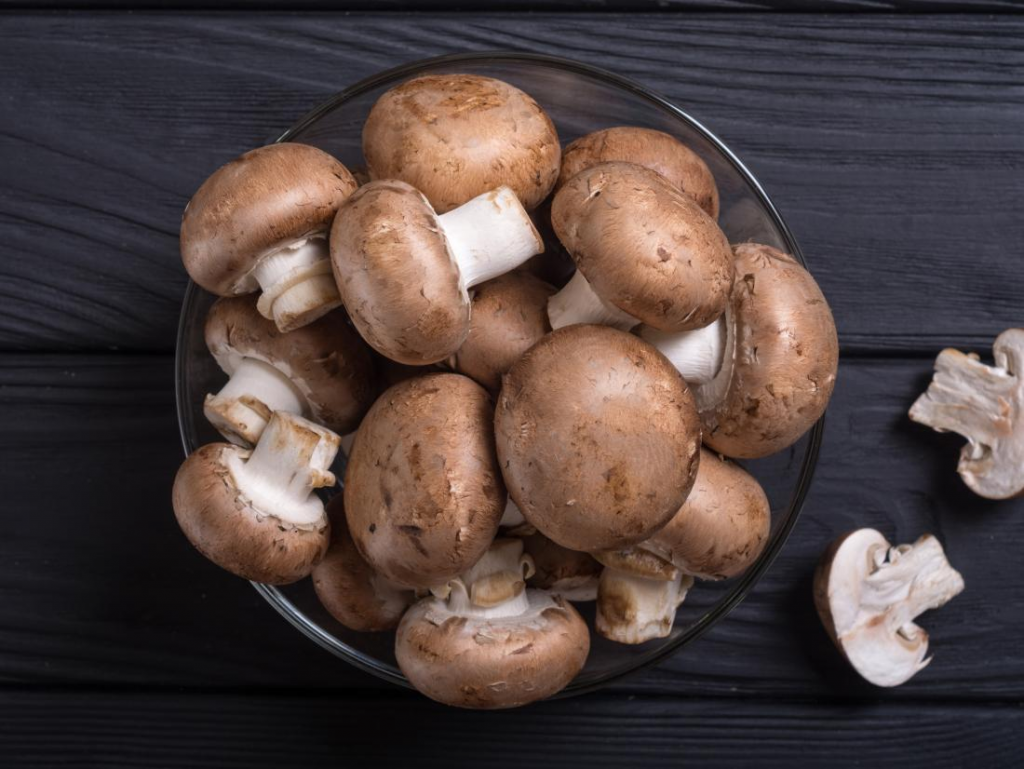
Nutrition dogs can get from mushrooms:
- Phosphorus
- Magnesium
- Protein
- Calcium
- Vitamin C
6. Potatoes
Dogs shouldn’t eat raw potatoes, but cooked potatoes in small quantities are fine. Potatoes can be steamed, boiled, baked, and roasted. All these four ways of cooking are safe for dogs. Oh, dogs can eat mashed potatoes, too.
But when cooking potatoes don’t add oil and seasoning.
Remember dogs mustn’t eat fried food and for sure should avoid french fries.
Nutrition dogs can get from potatoes:
- Potassium
- Carbs
- Protein
- Phosphorus
- Magnesium
7. Sweet Potatoes
As potatoes, sweet potatoes shouldn’t be given raw. But cooked potatoes are totally fine for your dog and that shouldn’t be worrying you. You can bake, boil, and steam them. But again don’t give them sweet potatoes with the skin as it can make their stomach upset.
Don’t give your dog sweet potatoes in the form of french fries.
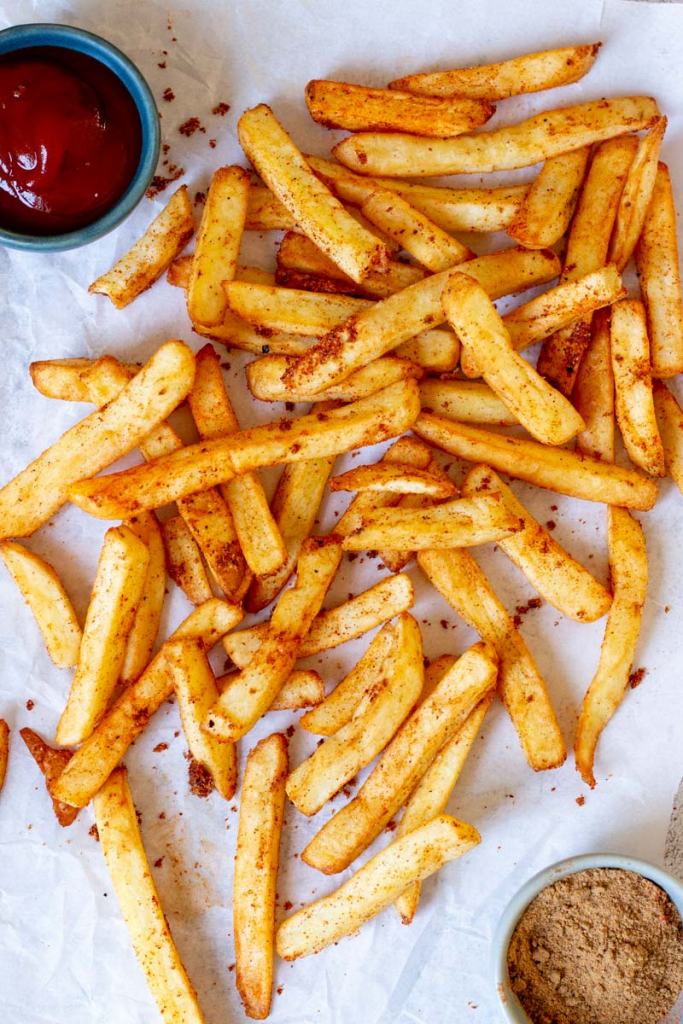
Nutrition dogs can get from sweet potatoes:
- Fiber
- Iron
- Calcium
- Vitamin A
- Vitamin B
- Potassium
8. Green Beans
Green beans can be consumed raw, cooked, and steamed.
Which is the best way to give them to my dog?
This depends on your dog and your way of cooking.
Raw green beans are safe but there is a risk of choking. Cooked green beans are easily chewed by dogs and easily digested, but many of the nutrients are destroyed because of the high heat temperature. Steaming green beans is the perfect way as they will not be difficult for chewing anymore but will still contain almost the nutrients they have in raw form.
Nutrition dogs can get from green beans:
- Folate
- Magnesium
- Vitamin A
- Vitamin K
- Iron
- Phosphorous
9. Lettuce
Lettuce is safe for dogs and is mostly preferred to be eaten raw, as it doesn’t look good cooked and by being cooked it loses all nutrients. Now I started wondering but have you ever cooked lettuce???
Can lettuce be included in salads for dogs?

If the salad doesn’t include oil, onion, garlic, seasoning, or any other toxic ingredients, then of course yes. But if you can’t be sure about any of the ingredients, then just don’t give it to your dog. Even if it’s good salad dogs should eat a very little amount of it.
Nutrition dogs can get from lettuce:
- Vitamin C
- Folate
- Calcium
- Fiber
10. Asparagus
In asparagus, dogs can eat the stalk, but they can’t eat the fern bit. The fern is toxic to dogs!
Dogs can eat both raw and cooked asparagus, but it’s very difficult to eat this veggie raw. The most enjoyable and beneficial asparagus for dogs are steamed. After steaming just cut it into small pieces and give them to your dog.
Nutrition dogs can get from asparagus:
- Riboflavin
- Folic acid
- Vitamin A
- Vitamin D
- Vitamin E
- Niacin
11. Celery
Celery should be given raw to dogs, as by being cooked it loses a lot of the nutrition. Chop the celery stalk into bite-sized pieces.
Nutrition dogs can get from celery:
- Vitamin C
- Vitamin K
- Folate
- Potassium
12. Spinach
Spinach can be given both raw and cooked to dogs, but being in its raw form can cause choking, and also the leaves can be difficult to be chewed well.
Nutrition dogs can get from spinach:
- Vitamin A
- Vitamin K
- Iron
- Calcium
13. Carrots
Carrots can be given raw, cooked, and frozen.
Did you know that by cooking carrots you can get more beta-carotene than its raw form?
Well, it’s true. Depending on the cooking of course you can get up to 40% beta-carotene, while raw carrots contain only 3%. Carrots can be boiled, steamed, baked, and roasted – alone or with other veggies that I have shared with you are safe for dogs.
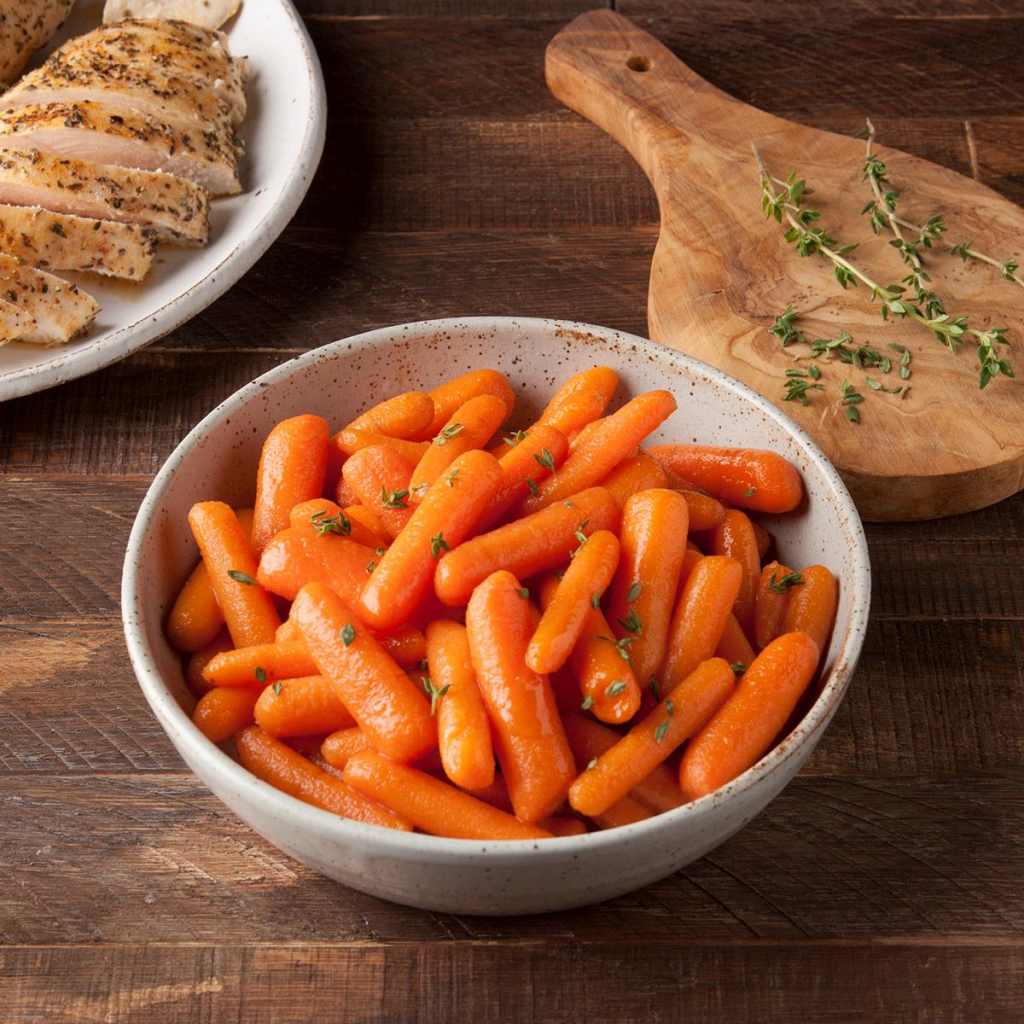
Raw carrots are beneficial for the dental health of your dog while frozen ones can prevent plaque buildup. Carrots and baby carrots can be great low-calorie treats.
Can dogs eat carrot puree?
Oh, yeah. Steamed and build carrots can be easily turned into puree.
Nutrition dogs can get from carrots:
- Fiber
- Vitamin A
- Magnesium
- Vitamin C
- Vitamin K
14. Cabbage
Cabbage is good for dogs cooked and raw. All types of cabbage are safe for your dog. Raw cabbage can prevent cell damage, while in cooked cabbage you can’t find thiocyanate – an anion that isn’t safe for dogs with thyroid problems.
Here you can see all the nutrients compared between three types of cabbage:
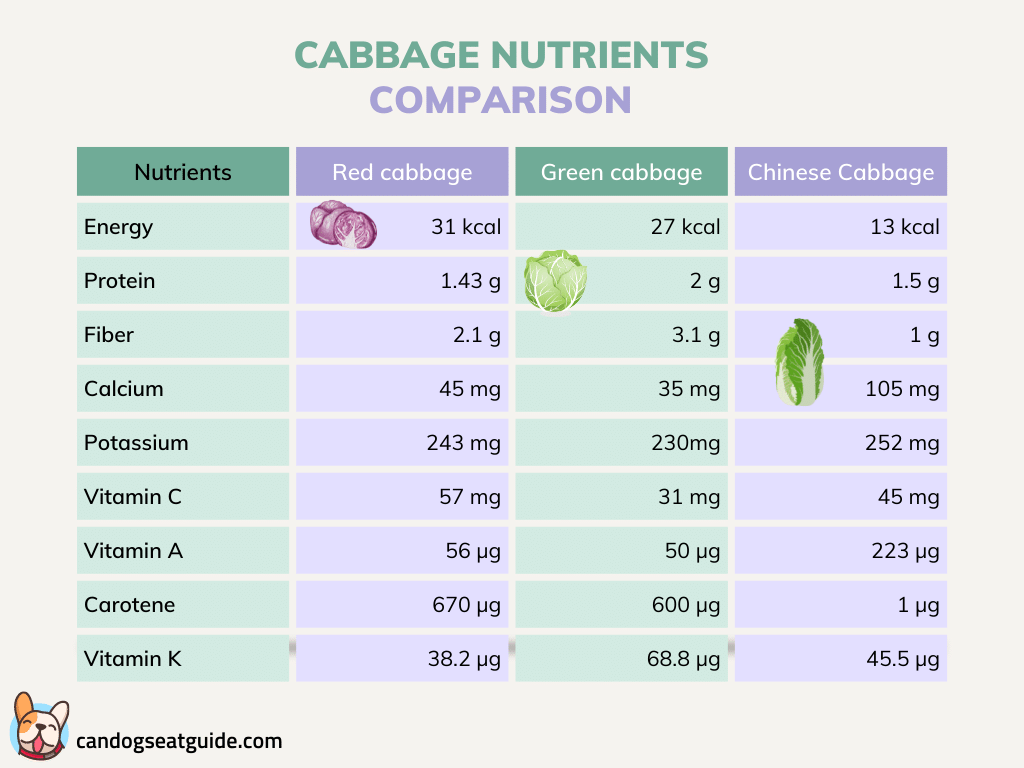
Can dogs eat cabbage soup?
Yes, dogs can eat cabbage if it doesn’t include garlic, onion, salt, or any other toxic veggie, fruit, or seasoning.
Nutrition dogs can get from cabbage:
- Fiber
- Potassium
- Carotene
- Calcium
- Protein
15. Cauliflower
Cauliflower is a great choice even for the most sensitive stomachs. You have 3 options for cauliflower: raw, cooked, or frozen. However, if you decide to give it to your dog it will be really nutritious low-calorie snack.
Cooked cauliflower can reduce bloating and gas.
Nutrition dogs can get from cauliflower:
- Vitamin C
- Fiber
- Vitamin K
- Folate
- Calcium
Illustration of Safe And Unsafe Veggies For Dogs
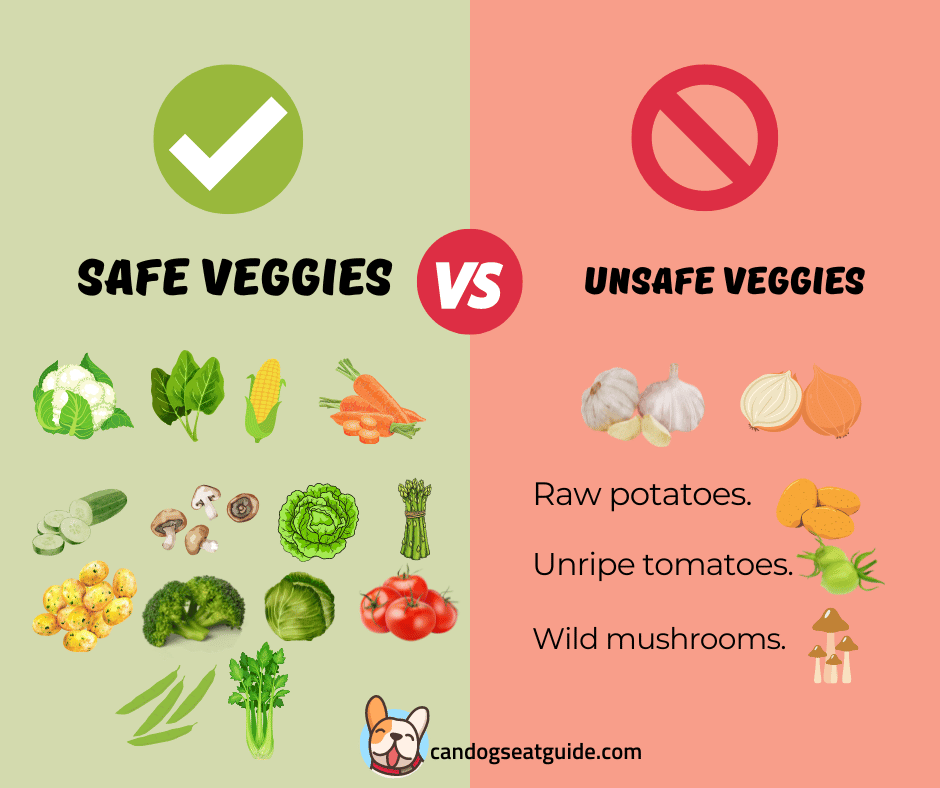
This illustration is only for reference and doesn’t include all vegetables that are safe or unsafe for your dog. You can check all veggies, here.
Can Dogs Eat Fruits?
Yes and No.
How?
There are many fruits that are safe for dogs and also many that aren’t safe – because of some part of the fruit or because they contain toxic ingredients.
Let’s see first the fruits that aren’t safe for dogs.
Toxic Fruits
1. Grapes and Raisins
Grapes and raisins (dry grapes) are very toxic to dogs, many cases even had a fatal end. Scientists still can’t understand by which component dogs get so a strong reaction but it’s highly recommended dogs avoid grapes and raisins and every product that contains them.
Usually, they are toxic in big amounts but every dog can react differently so it’s better to not risk it as it can cause kidney damage. No matter the kind of grapes – seedless, with seeds, skin lees, with skin, and all different varieties, there are cases for every kind.
2. Avocado
Avocado contains persin – a toxic that is especially toxic to dogs. Every part of the avocado – pits, leaves, fruit, and plant – contain persin.
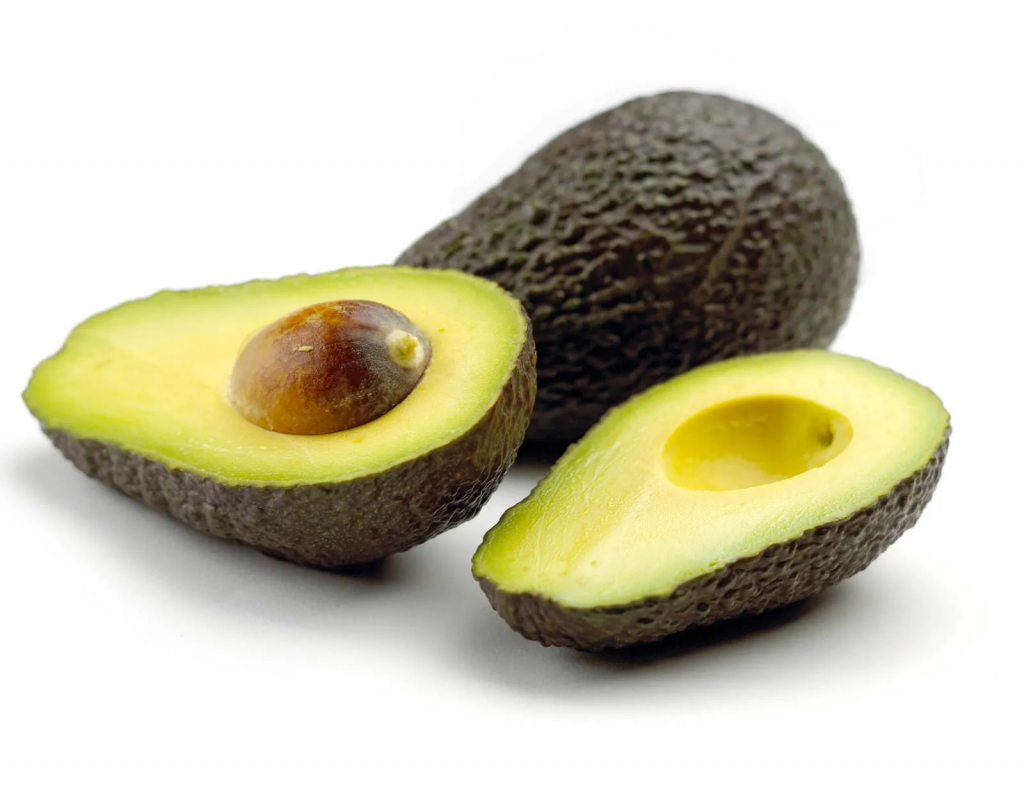
The flesh of the avocado is high in fat content and big amounts of it can cause weight gain, pancreatitis, and an upset stomach. The flesh of avocado contains a little amount of persin, that’s why many vets say that a slice of it will not hurt your dog but big amounts for sure will.
3. Cherries
The pits, stems, and leaves of cherries contain cyanide – a poisonous toxin that can lead to a fatal end. The pit can also lead to intestinal blockage. So, this is another fruit that should be avoided by dogs.
4. Lemons and Limes
The digestive system of dogs doesn’t agree much with lemons and limes. This happens because of the high concentration of citric acid. And actually, lemons and limes can’t give any nutritional benefits to our pets.
Vets believe that dogs will not eat food that tastes bitter because they think it’s poisonous. Vets call this way of surviving.
5. Grapefruit
Another fruit that shouldn’t be consumed by dogs.
Why?
Another fruit that is high in citric acid. Even a bit of citric acid is toxic for dogs.
Having too much citric acid can cause vomiting, loose stools, etc.
Safe Fruits For Dogs
As I already have shared with you the toxic fruits now it’s time for the safe ones. As every fruit is safe if given in small amounts and not very often.
Don’t forget human food is only for snacks, it shouldn’t replace real dog meals.
1. Bananas
Bananas are a great healthy snack because of their low content of sodium and cholesterol. But it should be given only as a snack as the banana contains a lot of sugar – like any other fruit.
Avoid giving your doggo banana peels as they can cause intestinal blockage.
Nutrition dogs can get from bananas:
- Potassium
- Biotin
- Vitamin B6
- Fiber
2. Watermelon
Dogs would love to have this healthy snack on hot summer days. There are two things you should pay attention to:
- small amounts, and
- seedless watermelon.
Dogs can’t digest watermelon seeds, so either buy a seedless watermelon or remove them. White seeds are a better option than black ones but still should be avoided.
You can give your dog a slice of watermelon at room temperature or frozen, and also can make puree from it.
Nutrition dogs can get from watermelon:
- Potassium
- Carbs
- Vitamin C
- Magnesium
3. Oranges
The only part of oranges you should give to your dog is the flesh, as peel and seeds can be dangerous for the stomach of your dog.
But many dogs aren’t interested in the smell of citrus, so probably your dog will not have it. But if your dog is fine with this smell, it’s better as it can get additional nutrition.
Nutrition dogs can get from oranges:
- Fiber
- Vitamin C
- Potassium
- Calcium
- Magnesium
4. Peaches
Dogs can eat peaches as a treat or snack. Two to three slices of peach will be enough for your dog to get additional nutrients but also a safe amount for a sensitive stomach of your dog.
Peach yogurts and jam aren’t safe for dogs’ health as they contain a lot of additives and sugar. Some of them contain xylitol which is very toxic to dogs.
Nutrition dogs can get from peaches:
- Vitamin A
- Fiber
- Potassium
- Magnesium
- Phosphorus
5. Blackberries
Blackberries are a natural recourse of xylitol. So why am I putting them in safe fruits?
Xylitol in blackberries is little as vets say you can find only traces of it, that’s why like every other fruit blackberries are safe in small amounts.

Nutrition dogs can get from blackberries:
- Vitamin C
- Vitamin E
- Vitamin K
- Calcium
- Manganese
6. Cranberries
Cranberries will be a great snack for your dog. They are a bit high in carbohydrates but if fed only as a treat that won’t be a problem for your dog or its tummy. These fruits are packed with so many antioxidants so it will be a huge mistake if you cut them out of the diet of your pooch.
Nutrition dogs can get from cranberries:
- Vitamin K
- Vitamin E
- Calcium
- Copper
- Manganese
7. Cantaloupe
Let’s start first with the seeds of the cantaloupe. You can feel relaxed, they are not toxic, so it’s not a problem if your dog has one or two while having it as a snack. You should be concerned if your dog tries to eat more seeds as they can cause choking hazards.
I am sure that you don’t eat the skin of the cantaloupe so don’t try to give it to your dog too, as it can be really difficult to digest.
Nutrition dogs can get from cantaloupe:
- Vitamin A
- Folic acid
- Iron
- Choline
- Vitamin K
8. Apricots
Apricots offer various health benefits for your dogs including lowered blood pressure and improved digestion. You can give your dog fresh apricot with removed pit, stem, and leaves. Dried apricots like every other dry fruit are higher in sugar but once in a while, it’s a good treat.
Nutrition dogs can get from apricots:
- Vitamin C
- Vitamin A
- Fiber
- Potassium
9. Strawberries

Strawberries are a great snack that will benefit your dog’s teeth – vitamin C and an enzyme contained in this fruit work perfectly to keep the white coating on the teeth. Avoid giving your dog canned strawberries or jam from strawberries as they have a high content of sugar and will not benefit your dog.
Nutrition dogs can get from strawberries:
- Potassium
- Magnesium
- Iodine
- Fiber
- Vitamin K
10. Raspberries
Raspberries are another fruit that contains xylitol – a bit more than blackberries. But it’s completely fine if you give just a few raspberries. They are a great treat for senior dogs as they have anti-inflammatory features, which can help aging joints.
Nutrition dogs can get from raspberries:
- Potassium
- Calcium
- Phosphorous
- Vitamin C
- Manganese
- Fiber
11. Apples
By removing the core and seeds from apples you will get a great snack for you and your dog. You can give them fresh or baked. Plain applesauce is another great treat.
Nutrition dogs can get from apples:
- Vitamin C
- Vitamin A
- Potassium
- Manganese
- Vitamin E
12. Pumpkin
Dogs can eat both seeds and pulp safely. It’s great for dogs suffering from constipation or diarrhea. Canned pumpkin is more nutritious than baked one because baked pumpkin contains more water.
You can give roasted pumpkin seeds to your pooch too.
Nutrition dogs can get from pumpkin:
- Vitamin A
- Potassium
- Calcium
- Vitamin E
- Fiber
13. Mango
Give your dog mango without the stem, peeled from its skin, and without the pit. It’s a great energetic treat. Don’t forget that in big amounts it can cause irritation to your dog’s tummy.
Nutrition dogs can get from mango:
- Vitamin A
- Vitamin B6
- Vitamin C
- Vitamin E
- Calcium
- Magnesium
14. Coconut
Which part of the coconut is safe for dogs?
Let’s start with the most popular part of it: coconut meat. The white fleshy part is perfectly safe for dogs. This part contains lauric acid – a saturated fat – that helps to reduce cholesterol levels.
Let’s see what is the situation with coconut water. Unfortunately, coconut water is not a good idea for dogs as it contains high levels of potassium, which can lead to the dehydration of cells.
Coconut milk is made by mixing milk and grated coconut meat. If your dog isn’t lactose intolerant, then you can feel free to give them a few ml of coconut milk.
And let’s see coconut oil that is part of almost all recipes for dog treats. Let’s start that coconut oil is great for the coat and skin of our furry friends. It can make wonders with it. But let’s see if dogs can consume it. If your dog has pancreatitis, then you should forget completely about coconut oil. But if your dog is healthy then coconut oil – a few drops of it – is safe for your doggo.
Nutrition dogs can get from coconut:
- Lauric acid
- Protein
- Fiber
- Carbs
15. Pineapple
Give your dog 1-2 slices of pineapple and it will be really happy. Avoid giving your doggo the core and skin of pineapple, as they are not easily digested. You can give it to your dog fresh or frozen on hot summer days.
Nutrition dogs can get from pineapple:
- Fiber
- Vitamin B6
- Iron
- Vitamin C
- Potassium
Illustration of Safe And Unsafe Fruits
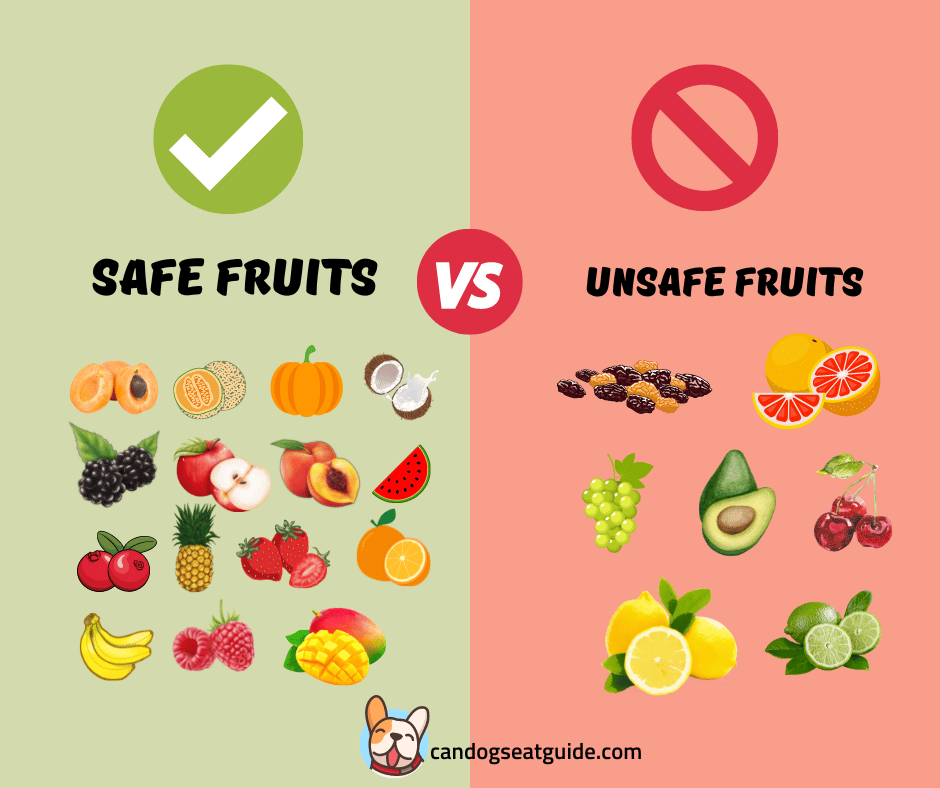
This illustration is only for reference and doesn’t include all fruits that are safe or unsafe for your dog. For more fruits, you can check here.
Can Dogs Eat Nuts?
Nuts aren’t the best thing you can give a dog but that’s why human food is only in the size of treats. You should be careful as some nuts are toxic but there are some good and safe options too. Also, all nuts are high in fats so you should be careful with the amounts and avoid them if your dog already has obesity or pancreatitis.
Feeding your dog nuts isn’t good because they are small in size and can lead to choking hazards. Don’t give your dog salted nuts as this can lead to water retention.
This time we will start with the nuts that dogs can eat and after that the nuts that should be avoided.
Safe Nuts For Dogs
1. Peanuts
Plain (dry-roasted or boiled) and unsalted peanuts are the only safe forms for dogs. Dogs should avoid salt-roasted, sweetened, buttered, and any peanuts containing some additional flavors.
Nutrition dogs can get from peanuts:
- Protein
- Vitamin E
- Niacin
- Vitamin B6
2. Cashews
Dog owners can give cashews in small amounts and not often otherwise they will add too many calories and fats to the dog’s diet and this won’t be healthy anymore.
Nutrition dogs can get from cashews:
- Copper
- Zinc
- Magnesium
- Unsaturated fats
- Protein
And we are over with the list of safe nuts for dogs.
Nuts That Should Be Avoided By Dogs
1. Macadamia nuts
I am starting the list with the most toxic nut but let me tell you a fun fact, it’s still unknown why macadamia nuts are toxic to dogs.
In many cases, dogs have shown signs of macadamia poisoning after ingesting 2.4 g of nuts/kg body weight. That’s why you should make sure that macadamia nuts stay in places that can’t be reached by your doggo.
2. Pecans
Pecans contain a toxin called juglone, which is safe for humans, but not for dogs. It’s not safe for some plants like tomatoes. Juglone is used for the survival of the nut tree
3. Walnuts
As pecans, walnuts contain the toxin juglone but in higher amounts – so walnuts are more toxic to dogs. It’s better for dogs to stay away from these nuts. Although there is a safe kind of walnuts – English walnuts – which don’t contain juglone but again you should be very careful with the amount your dog is taking and the choking hazards.

4. Almonds
Almonds are not toxic to dogs as macadamias, pecans, or walnuts but aren’t safe. As with every other nut, the fat content is high. With almonds choking hazards are more serious as the nut is thicker but more slippery.
5. Brazil nuts
Brazil nuts are known as the nuts containing the highest levels of fat and having too much fat can lead to pancreatitis. Brazil nuts also can upset a dog’s stomach and cause a lot of digestive issues.
Illustration of Safe And Unsafe Nuts
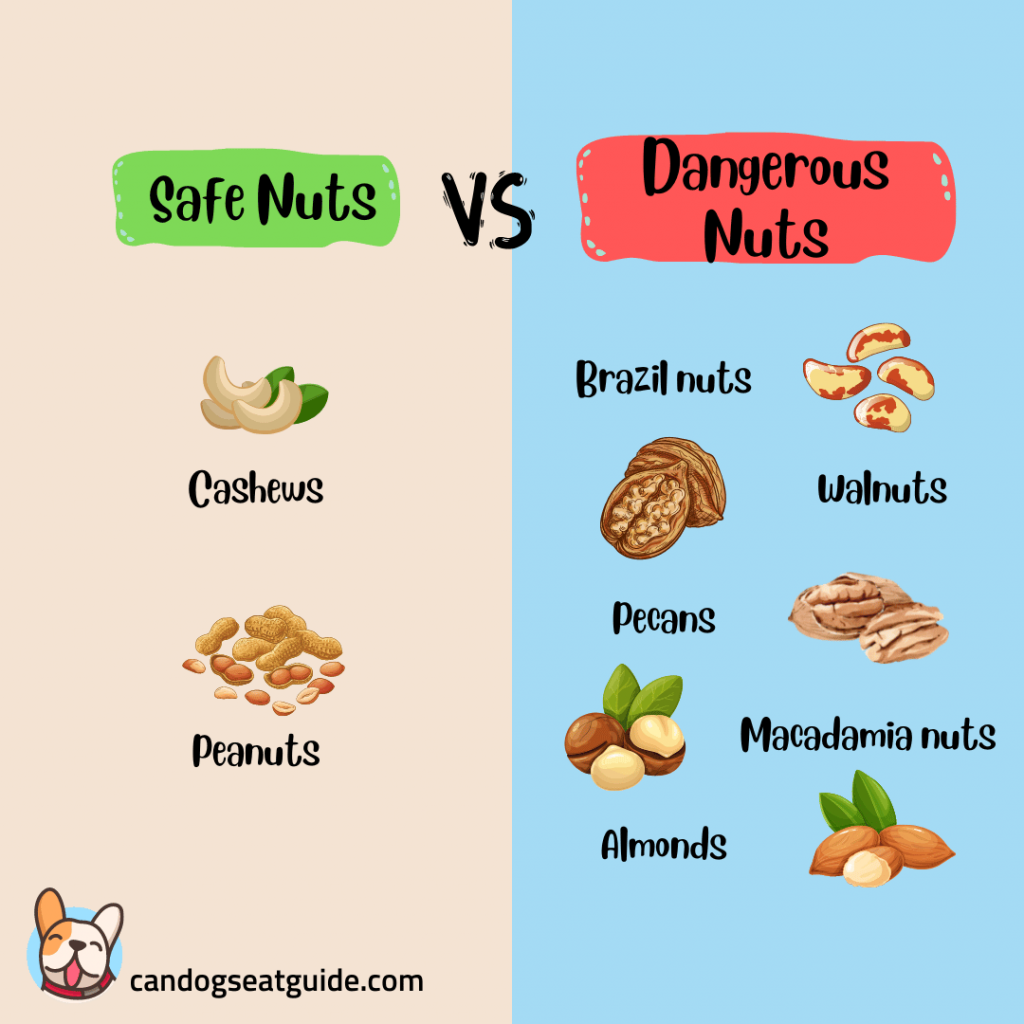
This illustration is only for reference and doesn’t include all nuts that are safe or unsafe for your dog. For more information, you can check here.
Let’s move to the next chapter of our article: “Meats”.
Can Dogs Eat Meat?
Did you know that:
Dogs are omnivores – they can have plant-based and meat-based diets. As the best option is a combination of both.
Some dogs can’t enjoy eating only fruits and veggies, or the metabolism of some dogs isn’t fine with a meat-based diet – but here mostly I am giving suggestions for healthy dogs. Of course, if your dog has some health issues you should listen only to your vet. Although even if the dog is completely fine again you should first advise yourself with the vet.
As omnivores dogs need meat but they are fine with plants too.
Meats Dogs Should Avoid
We have a whole article on this topic that you can check: What Meat Dogs Should Avoid Eating? and there I have explained very carefully all 11 types of meat that should be avoided and why.
I want to start the list with the most topic type of meat you can give a dog.
1. Raw Meat
Raw meat is very dangerous to dogs as it’s full of bacteria and eating raw meat can cause pancreatitis.
Raw pork meat is the worst option as pigs carry the deadly disease Aujeszky and because of eating raw pork meant many dogs have died.
Raw minced meat isn’t a good idea too because it contains a lot of added salt, spices, and flavorings, which aren’t healthy for dogs. Also, raw minced meat loses many of the nutrients while being processed.
2. Chicken and Turkey Skin
The skin of both chicken and turkey shouldn’t be given raw. But usually, when you cook the skin you use some oil or herbs, maybe onion or garlic. All these things are bad for dogs as onion and garlic are even poisonous. Even if you boil the skin and don’t add anything still skin is high in fat and calories without any additional nutritional value.
3. Ham, Bacon, Proscuitto, and Salami
All these types of meat are processed and contain a lot of fat and sodium.
To be preserved for longer there are used nitrates and nitrites that are sodium-based preservatives. And the level of sodium gets too high. Too much salt can cause many health issues for dogs and they can get bad eyesight.
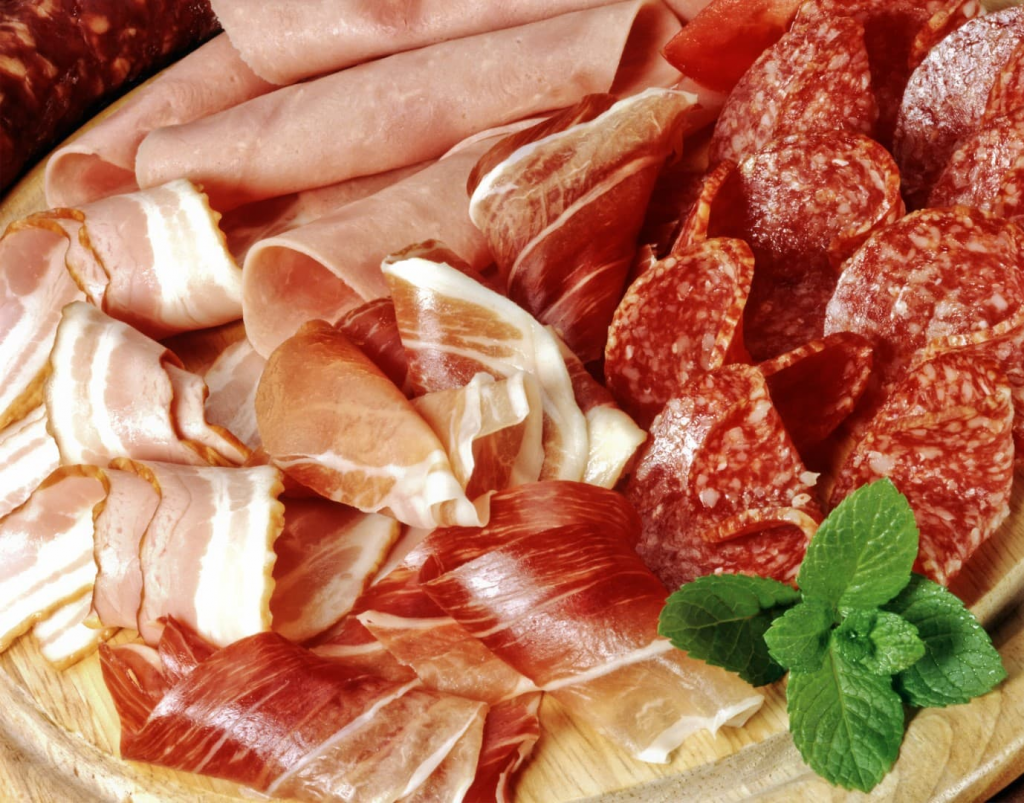
The fat in ham, bacon, proscuitto, and salami is difficult to be digested and can cause digestive problems like bloating and abdominal pain. And the fat that can’t be digested properly can cause pancreas inflammation that can lead to pancreatitis.
There comes another reason, all these types of processed meat contain flavorings. These added herbs and species can be very harmful to dogs and disturb the stomachs of dogs.
4. Pepperoni
Our beloved pepperoni pizza unfortunately is not safe to be given to dogs.
Why?
Let’s start that there are too many herbs and sauces on pizza that aren’t safe.
Then we have the pepperoni. This processed meat contains tons of sodium and salt – both very unhealthy for dogs.
5. Bones
All types of bones are bad for dogs – turkey, chicken, beef, and lamb.
If they are raw they contain bad bacteria which is dangerous for their health. But if the bones are cooked then they are easy to splinter while chewing and that can cause tears in the throat or inside the digestive tract that can be life-threatening.
6. Spoiled meat
Like, let me ask you something, why would you even think of giving spoiled food to dogs? Do you think that they are digestive system is better than ours? Do you think that everything will be fine after that?
Spoiled meat contains so many different types of bacteria that are very harmful to a dog’s stomach, nervous system, and heart.
Let’s see the positive side now.
What Meats Are Safe For Dogs?
All the types of meat that are below are safe in small amounts but it’s very recommended that if dogs get enough protein from their dog’s food do not give them extra meat, as extra protein isn’t good.
1. Chicken
Chicken and more specifically chicken meat is very safe for dogs and that’s why in dog food that is one of the most common ingredients that is a source of protein. But meat should be cooked by boiling, baking, or roasting, it shouldn’t be undercooked, and it should be cooked without oil, onion, garlic, and any herbs as they can irritate the stomach of dogs.
Nutrition dogs can get from chicken:
Rich in:
- protein, particularly lean protein,
- vitamins B3 and B6, and
- minerals like phosphorous and selenium.
All these nutrients together keep the dog’s immune system stronger and the minerals are keeping the metabolism of dogs working enough fast.
Chicken broth is also safe for dogs
2. Turkey
Turkey meat is good for dogs if it is cooked properly and without garlic and onion. Turkey is safe for dogs if given in moderation. The meat of turkey is leaner than chicken and contains more phosphorous and magnesium than chicken. Turkey is lower in fat and calories than red meats.
Nutrition dogs can get from turkey:
- Protein
- Fats
- Magnesium
- Iron
- Phosphorous
3. Beef
Grounded beef is a great choice for dogs if there aren’t any species. Beef broth is safe for dogs too as it can help if your dog is dehydrated. Cooked beef without seasonings is a better choice but you should be careful as red meat is richer in fat and calories. Give only in moderation.
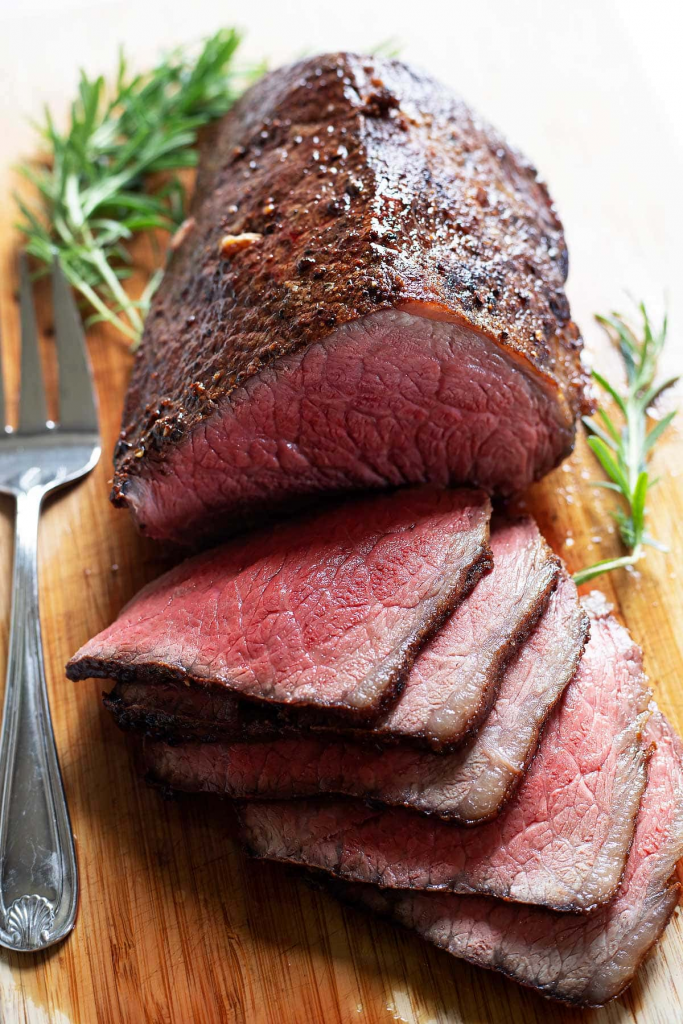
Nutrition dogs can get from beef:
- Protein
- Selenium
- Zinc;
- Vitamin B12
- Magnesium
4. Lamb
Another great option for protein, fats, vitamins, and minerals. Again dogs should eat only cooked meat and without any seasonings. Some dog foods contain lamb meat while others contain lamb meal.
What is the difference?
Lamb meal is containing less water and also is richer in proteins.
Nutrition dogs can get from lamb:
- Protein
- Potassium
- Zinc
- Iron
5. Pork
Again a great source of protein with good amounts of omega-3 fatty acids and amino acids. Only plain cooked pork is good for dogs but make sure it’s not undercooked. This time of meat is a bit richer in fat but in small quantities, it can be fine for healthy dogs and small puppies.
Nutrition dogs can get from pork:
- Protein
- Phosphorus
- Potassium
- Magnesium
- Fat
Illustration of Safe And Unsafe Meats
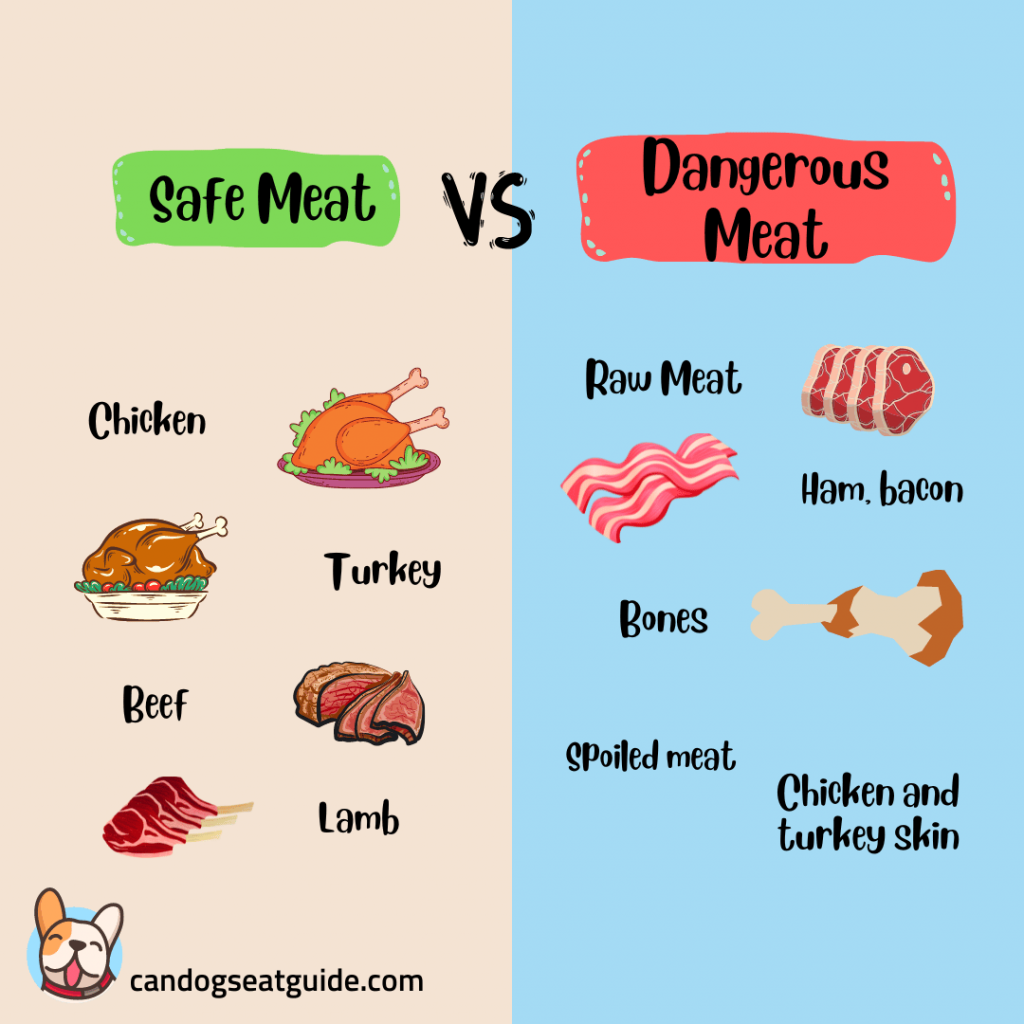
This illustration is only for reference and doesn’t include all types of meat that are safe or unsafe for your dog.
After we have discussed meat, let’s see what is happening with fish.
Can Dogs Eat Fish?
Yes, dogs can eat fish but not all fish is safe for dogs. By eating fish dogs will get a really good amount of omega-3 fatty acids and if your dog has meat allergies, fish is a great alternative when we talk about dog food.
You should be very careful with fish bones as they are very small and that makes them very dangerous. They can easily break while dogs chew them and then cause tears in the digestive tract are guaranteed.
Safe Fish For Dogs
1. Salmon
Omega-3 fatty acids are known for their anti-inflammatory properties but they are also helping the immune system of dogs to stay strong and their coats to be shiny.
Cooked salmon is a very great option for dogs, the fish should reach at least 145 degrees of internal temperature.
Smoked salmon is dangerous for dogs as it can dehydrate them and some smoke salmon contain sugar.
Note: Remove the skin of salmon as it is rich in fats and calories.
Nutrition dogs can get from salmon:
- Protein
- Fat
- Selenium
- Vitamin D
- Vitamin B12
- Niacin
2. Cod
Every type of cod is safe for dogs, if you can get your hands on fresh cod that’s great as frozen fish isn’t a good option sometimes. You can bake, grill, or stem the cod, just make sure the piece you will give your dog is without any seasoning or sauces, as they can disturb the digestive system. Don’t forget to remove the bones and then just serve the cooked fish to your dog as a treat or as a part of their meal.
Nutrition dogs can get from cod:
- Protein
- Vitamin C
- Calcium
- Vitamin B12
3. Haddock
Haddock is safe for dogs that’s why you can find it in some dog foods too. The best ways of cooking haddock are steaming and baking it. Don’t add garlic or onions to it, if you want to add some veggies to it check the section for them and see which are safe for your dog.
Nutrition dogs can get from haddock:
- Protein
- Magnesium
- Niacin
- Vitamin B6
- Selenium
4. Flounder
As other fish flounder is high in lean protein but a bit richer in omega-3 fatty acids than some other fish. As with every other fish on the list for safe fish, flounder is low in mercury.
Make sure all bones are out of the piece of flounder you are giving your dog, you can cook this fish by steaming or poaching it in water without additional flavors.
Nutrition dogs can get from flounder:
- Protein
- Calcium
- Vitamin C
- Vitamin D
- Selenium
5. Tilapia
Dogs can eat without worry cooked and deboned tilapia. Fish should be deboned as bones can splinter while eating and cause internal damage. If you can get fresh tilapia that’s the best option because frozen isn’t that good and for sure avoid pre-cooked options as they are already fried or marinated in sauce, all this can upset the stomach of your dog.

Nutrition dogs can get from tilapia:
- Selenium
- Potassium
- Niacin
- Protein
- Vitamin B12
6. Sardines
The best option is fresh sardines but sometimes canned ones are also good just depends on the ingredients. Canned sardines should be in the water, without added oil or salt.
As sardines can be offered cooked and raw. Give your dog bite-sized sardines to avoid choking hazards.
Nutrition dogs can get from sardines:
- Iron
- Calcium
- Selenium
- Protein
- Omega-3 fatty acids
Fish That Should Be Avoided By Dogs
Large and old fish should be avoided as they contain high levels of mercury and usually there are too many parasites on their skin, organs, and muscle tissues.
1. Raw Fish
Raw fish isn’t safe for dogs as it can contain bacteria and parasites but by cooking it they die. It’s a common case where dogs get worms by consuming raw fish. Eating raw fish can lead to salmon poisoning – this poisoning can occur not only by eating raw salmon but also by eating raw or undercooked steelhead, trout, or salamanders.
After consuming raw fish your dog may experience:
- fever
- diarrhea
- vomiting
- weight loss
- loss of appetite
- weakness
- dehydration
2. Shark
Sharks aren’t safe for dogs as the mercury levels in these fish are too high and can lead to mercury toxicity.
Signs of mercury toxicity:
- vomiting
- diarrhea
- abdominal pain
Mercury toxicity can damage the nervous system and kidneys.
3. Swordfish
Large and older fish like swordfish contain high levels of mercury but also they are rich in other heavy meals too. There is another reason why dogs should avoid swordfish and that’s because it has high levels of cholesterol which aren’t good for dogs with health problems, especially heart problems.
4. Tilefish

Dogs should avoid tilefish. Again tilefish like the other fish above is high in mercury and these levels are unhealthy for dogs.
Illustration of Safe And Unsafe Fish
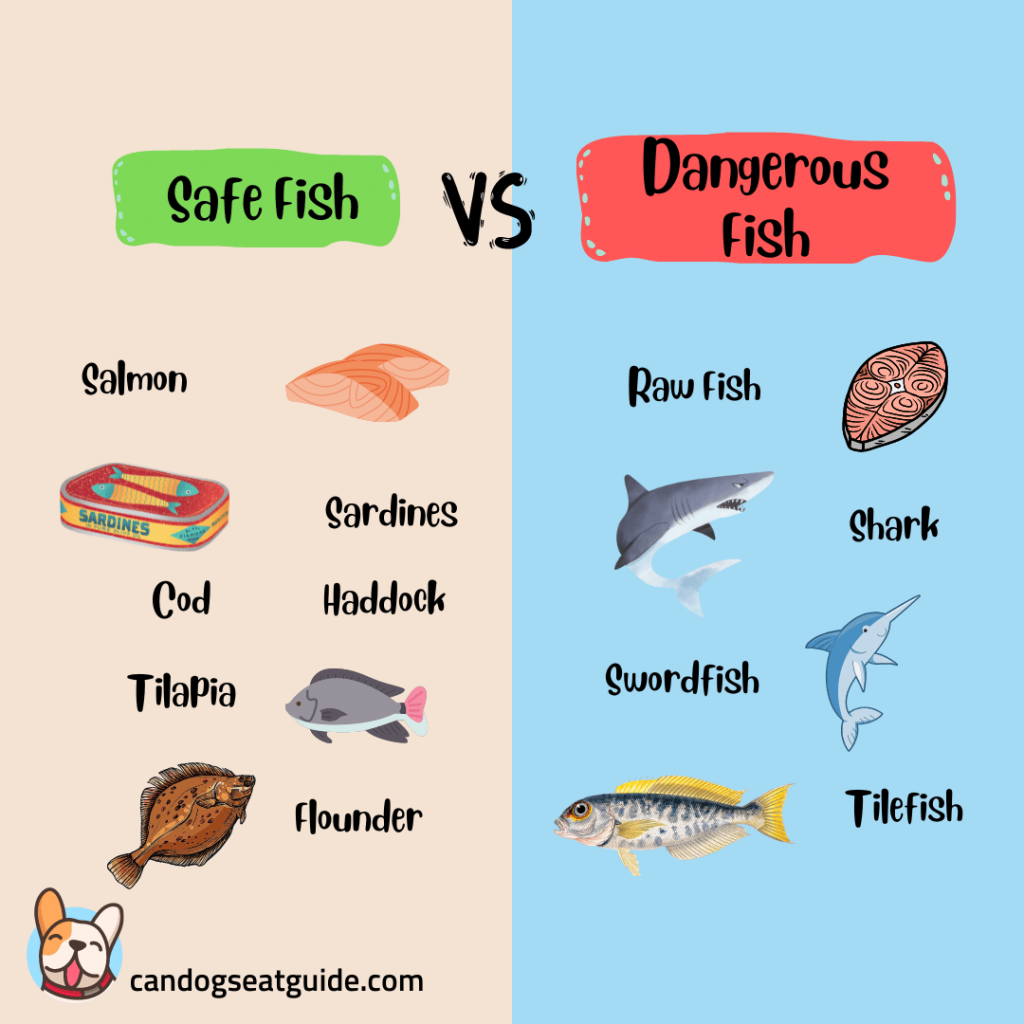
This illustration is only for reference and doesn’t include all types of fish that are safe or unsafe for your dog.
Can Dogs Eat Dairy Products?
The answer to this question isn’t straightforward as dogs in different stages of life need different nutrients and their metabolism works differently.
Dogs can enjoy the most dairy products while they are in the puppy stage as it’s very rare for puppies to be lactose intolerant.
How to know if my dog is lactose intolerant?
That’s actually easy. Give them a bit of milk and monitor if there are any signs like diarrhea, vomiting, bloating, abdominal pain, or gases, then your four-legged doggo for sure shouldn’t consume dairy products in the future. If there aren’t any signs then you can give some dairy products as a treat to your dog.
But there is another case when dogs for sure should avoid milk and that’s it if they have a milk protein allergy.
How to know if my dog has a milk protein allergy?
The common signs of this allergy include red and itchy skin, ear infections, hair loss, loss of appetite, and excessive licking. But sometimes the allergy signs can be mistaken for lactose intolerance and then you should go and let your dog be checked by a vet.
It’s time to see which dairy products are a sure NO for dogs no matter in which stage of life they are – puppyhood, adulthood, or they are seniors.
What Dairy Products Should Be Avoided By Dogs?
1. Chocolate Milk
A popular Christmas drink that all of us love to have no matter our age. Can we share a few sips with our dogs? Unfortunately no. Even if our dogs aren’t lactose intolerant, dogs shouldn’t consume chocolate as it contains theobromine and caffeine which are toxic and this drink can turn into a poisoning treat.
2. Butter
Butter isn’t a product that should be part of the daily meal of dogs. You can give a bit of it to your dogs but it will not get any additional nutrition except high amounts of fat and sodium if you give salted butter. Unsalted butter is a bit better option. But I personally would not recommend it, especially if your dog has some health problems like diabetes, obesity, or heart issues.
3. Blue Cheese
It’s the most dangerous type of cheese a dog parent can think of. It contains so many types of fungi that are harmful to dogs. Let’s see what can be the signs of consuming blue cheese your dog may experience:
- vomiting diarrhea
- high fever
- seizures
If you notice any of these signs or you have doubts that your dog had blue cheese, then call your vet immediately.
4. Feta Cheese
Some types of feta cheese contain less lactose but it’s really difficult to tell which, so feta cheese should stay in the section of dairy products that should be avoided. Other nutrients that are high in this type of cheese are fats and sodium.
Flavored feta cheese is dangerous for dogs as herbs and garlic aren’t doing good with the stomachs of dogs.
5. Brie Cheese
Brie cheese should be avoided by dogs because of its high content of saturated fats. A lot of saturated fats aren’t a healthy option for dogs.
6. Ice Cream
Ice cream is better to stay a snack only for us. Dog’s body doesn’t need a lot of sugar and calories to perform well. All of us know that ice cream isn’t only milk but contains a lot of added ingredients and artificial flavors. There are fruits included that may not be safe for dogs or some nuts. A chocolate coat on ice cream is harmful, too.
Of course, there are sugar-free options but they contain xylitol then. A sweetener that can poison dogs and can lead to life-threatening health issues like hypoglycemia (low blood sugar).
Now it’s time to check what is safe for dogs that don’t have lactose intolerance.
Safe Dairy Products For Dogs
As with every other category of human food dairy products can only be included in small amounts and not very often.
I want to say again that these dairy products are safe only for dogs that aren’t having any issues like lactose intolerance or milk protein allergy.
Of course, the first product we will check is:
1. Milk
Milk is the favorite beverage of small kids and some adults. It’s a favorite of puppies too. It’s known as a very nutritious drink. For adult and senior dogs, it’s recommended to be given in very small amounts or to be avoided.
Nutrition dogs can get from milk:
- Calcium
- Vitamin D
- Riboflavin (known also as Vitamin B2)
- Vitamin B12
- Potassium
2. Yogurt
Dogs can eat safely yogurt but not every type of yogurt. The most suitable types are plain and Greek yogurt. Both should be given in small amounts.
You should avoid giving yogurts that have additives like artificial flavorings as they are containing xylitol too and it can be bad for your doggo.

You know that greek yogurt needs more milk and you may think it’s richer in lactose but it’s exactly the opposite. By the straining process that is done to reduce the water amount, lactose gets less too.
Nutrition dogs can get from Greek yogurt:
- Protein
- Carbs
- Vitamin B12
- Vitamin A
- Riboflavin
Nutrition dogs can get from plain yogurt:
- Carbs
- Protein
- Fat
- Sugars
- Calcium
The nutrition that dogs are getting from both kinds of yogurts is actually the same but the amounts are different.
3. Kefir
A drink that is getting more and more popular in the last few years. It can be made with milk or coconut water. For milk, can be used cow, goat, or sheep milk. The consistency is like yogurt but it’s made from fermenting grains containing fungi, yeast, or bacteria. Kefir is a powerful probiotic product that should be given in small amounts.
Nutrition dogs can get from kefir:
- Protein
- Carbs
- Fat
- Sugar
- Calcium
- Vitamin A
4. Cheese
It’s great for dogs if given in small amounts but herbs, flavorings, or species shouldn’t be added. All these extra ingredients can cause an upset stomach.
Cheese contains much more fats than some other dairy products which can cause problems for dogs with sensitive stomachs, pancreatitis, or obesity.
The healthiest version of cheese that can be given to dogs is cottage cheese as it is low in sodium and lactose. This type of cheese is also the lowest in fat.

Mozzarella cheese also contains less fat and lactose but can be difficult for eaten because of its texture. If you cut it into small pieces this won’t be a problem anymore for you and your dog.
Goat cheese is also a good option for dogs as goat milk is easier to digest by dogs. It’s again containing less fat than cow cheese.
Gouda cheese is also a safe option for dogs but the content of fat is a bit higher than the other options.
Illustration of Safe And Unsafe Dairy Products
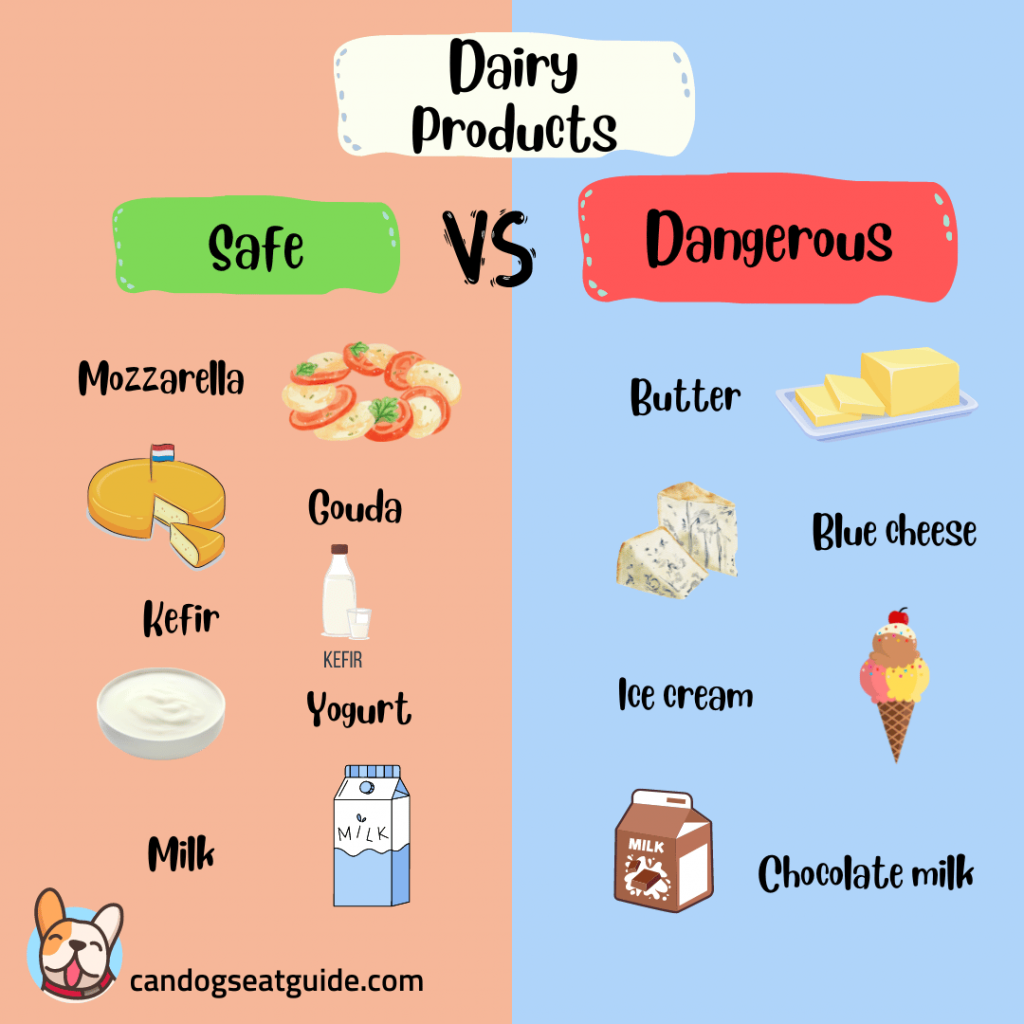
This illustration is only for reference and doesn’t include all types of dairy products that are safe or unsafe for your dog.
Conclusion
There is a long list of human foods that are safe for our four-legged friends and they can even be found as ingredients in their dog food, especially meat. Dogs need both meat and plants as part of their food that’s why we should make sure everything they eat is healthy and with good nutrition.
Can dogs eat human food? Yes, they can but you should be very careful when giving a new type of food to your dog and always advise yourself with your vet.
I hope that this guide will be helpful to you and you can share which type of human food you have shared with your dog or if you are considering doing it.

